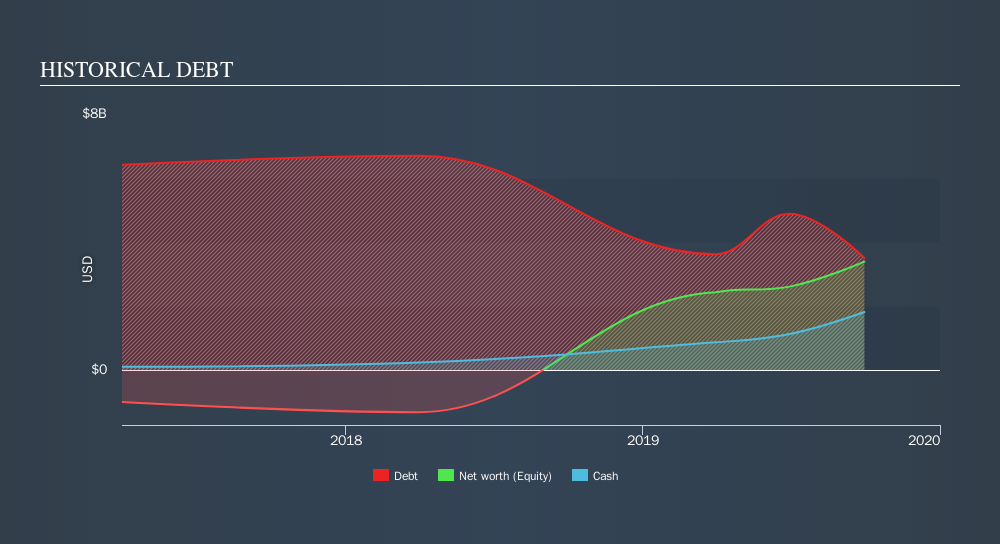- United Kingdom
- /
- Wireless Telecom
- /
- LSE:AAF
These 4 Measures Indicate That Airtel Africa (LON:AAF) Is Using Debt Extensively

David Iben put it well when he said, 'Volatility is not a risk we care about. What we care about is avoiding the permanent loss of capital. So it might be obvious that you need to consider debt, when you think about how risky any given stock is, because too much debt can sink a company. We note that Airtel Africa Plc (LON:AAF) does have debt on its balance sheet. But the more important question is: how much risk is that debt creating?
When Is Debt Dangerous?
Debt is a tool to help businesses grow, but if a business is incapable of paying off its lenders, then it exists at their mercy. If things get really bad, the lenders can take control of the business. While that is not too common, we often do see indebted companies permanently diluting shareholders because lenders force them to raise capital at a distressed price. Of course, debt can be an important tool in businesses, particularly capital heavy businesses. When we think about a company's use of debt, we first look at cash and debt together.
See our latest analysis for Airtel Africa
What Is Airtel Africa's Net Debt?
As you can see below, Airtel Africa had US$3.50b of debt at September 2019, down from US$4.84b a year prior. However, because it has a cash reserve of US$1.81b, its net debt is less, at about US$1.69b.

How Strong Is Airtel Africa's Balance Sheet?
According to the last reported balance sheet, Airtel Africa had liabilities of US$2.48b due within 12 months, and liabilities of US$3.78b due beyond 12 months. Offsetting these obligations, it had cash of US$1.81b as well as receivables valued at US$131.0m due within 12 months. So its liabilities outweigh the sum of its cash and (near-term) receivables by US$4.32b.
Given this deficit is actually higher than the company's market capitalization of US$2.92b, we think shareholders really should watch Airtel Africa's debt levels, like a parent watching their child ride a bike for the first time. In the scenario where the company had to clean up its balance sheet quickly, it seems likely shareholders would suffer extensive dilution.
We use two main ratios to inform us about debt levels relative to earnings. The first is net debt divided by earnings before interest, tax, depreciation, and amortization (EBITDA), while the second is how many times its earnings before interest and tax (EBIT) covers its interest expense (or its interest cover, for short). This way, we consider both the absolute quantum of the debt, as well as the interest rates paid on it.
While Airtel Africa's low debt to EBITDA ratio of 1.4 suggests only modest use of debt, the fact that EBIT only covered the interest expense by 3.3 last year does give us pause. So we'd recommend keeping a close eye on the impact financing costs are having on the business. If Airtel Africa can keep growing EBIT at last year's rate of 17% over the last year, then it will find its debt load easier to manage. When analysing debt levels, the balance sheet is the obvious place to start. But ultimately the future profitability of the business will decide if Airtel Africa can strengthen its balance sheet over time. So if you want to see what the professionals think, you might find this free report on analyst profit forecasts to be interesting.
But our final consideration is also important, because a company cannot pay debt with paper profits; it needs cold hard cash. So we always check how much of that EBIT is translated into free cash flow. Over the most recent three years, Airtel Africa recorded free cash flow worth 59% of its EBIT, which is around normal, given free cash flow excludes interest and tax. This cold hard cash means it can reduce its debt when it wants to.
Our View
Airtel Africa's struggle to handle its total liabilities had us second guessing its balance sheet strength, but the other data-points we considered were relatively redeeming. But on the bright side, its ability to grow its EBIT isn't too shabby at all. Taking the abovementioned factors together we do think Airtel Africa's debt poses some risks to the business. So while that leverage does boost returns on equity, we wouldn't really want to see it increase from here. Another positive for shareholders is that it pays dividends. So if you like receiving those dividend payments, check Airtel Africa's dividend history, without delay!
When all is said and done, sometimes its easier to focus on companies that don't even need debt. Readers can access a list of growth stocks with zero net debt 100% free, right now.
We aim to bring you long-term focused research analysis driven by fundamental data. Note that our analysis may not factor in the latest price-sensitive company announcements or qualitative material.
If you spot an error that warrants correction, please contact the editor at editorial-team@simplywallst.com. This article by Simply Wall St is general in nature. It does not constitute a recommendation to buy or sell any stock, and does not take account of your objectives, or your financial situation. Simply Wall St has no position in the stocks mentioned. Thank you for reading.
About LSE:AAF
Airtel Africa
Provides telecommunications and mobile money services in Nigeria, East Africa, and Francophone Africa.
High growth potential and slightly overvalued.
Similar Companies
Market Insights
Community Narratives





